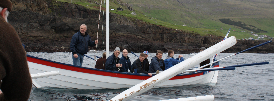The old whaling boats
In the town of Vágur on the island of Suðuroy, the southernmost of the Faroe Islands (18 small islands in the midst of the North Atlantic), locals have managed to preserve an important part of the unique Faroese maritime heritage, by preserving the so-called “old whaling boats”
The old whaling boats in Vágur are actually traditional Faroese wooden rowing boat. The old whaling boats include ten 8- and 10-man rowing boats. Originally, the boats were built as fishing boats, in some cases though as whaling boats or for rowing-competitions.
The name “the old whaling boats” has appeared because the boats, besides fishing, also were used when pilot whales were driven into the fjords on Suðuroy, killed and used as an important part of the islander’s nutrition.
In Vágur people have managed to preserve the boats as they were originally built. The oldest of the boats, Gjógvarábáturin, was built in 1873. Four boats origin from the early 1900s, four were built in the 1920s and 1930s, and one in 1960.
Today the old whaling boats are an important part of local cultural life in Vágur. Locals own the boats, typically with ten owners to a 10-man boat and eight owners to an 8-man boat. Each year the boats are used for excursions, rowing and sailing with sails from Vágur-fjord to other villages on the island of Suðuroy or the other parts of the Faroe Islands.
The excursions are an important part of the life in the association “the Old Whaling Boats in Vágur” (Grindabátarnir í Vági), as well as the yearly excursions also encourages maintaining the old boats. More than 100 people, men and women in all ages, are part of these excursions, which also are an important part of passing along knowledge about our maritime cultural heritage from the older generations to the younger ones.
The old whaling boats in Vágur are probably the only association of its kind in the world. Through the association the old Faroese rowing boats are preserved as they were originally built, as well as the boats are part of local social and cultural life, encouraging knowledge transfer from our ancestors to the younger generations.



